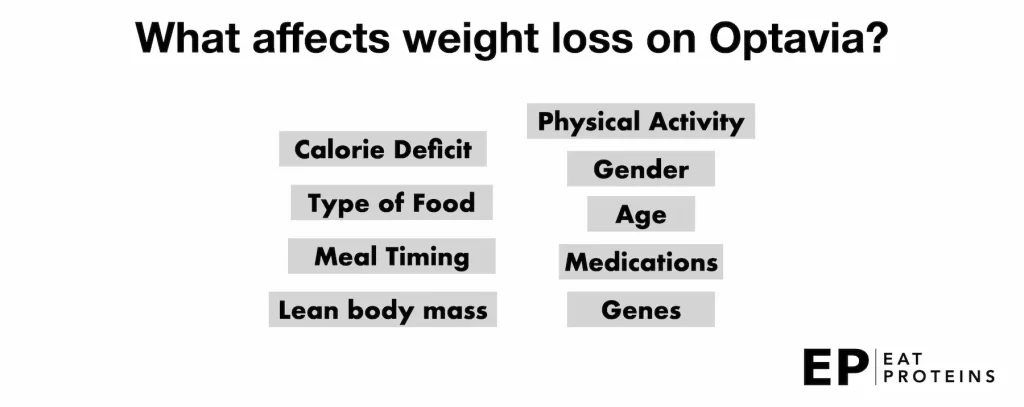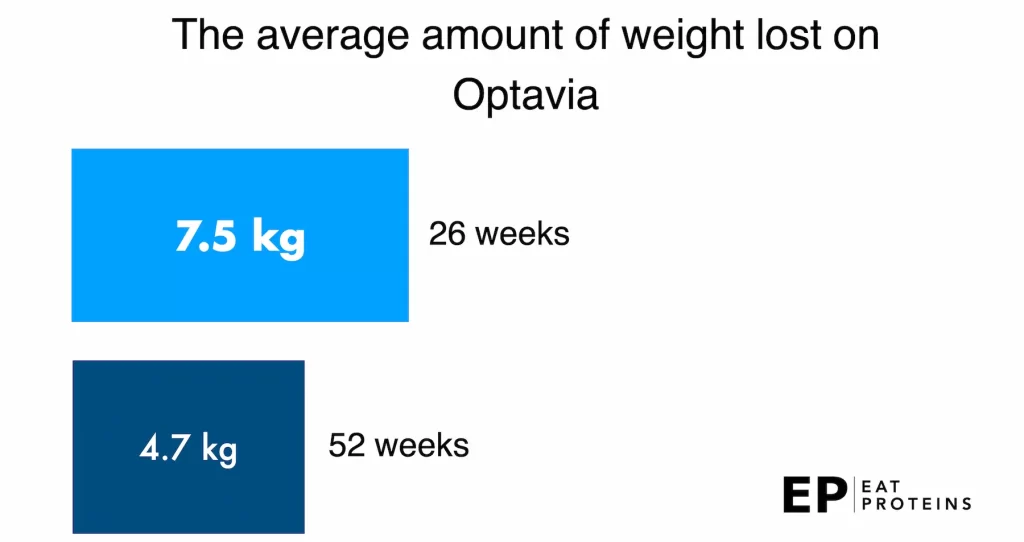
According to a 2019 study published in the Obesity Science & Practice Journal, individuals following the Optavia 5 and 1 diet can lose an average of 5.2 kilograms (11.5 pounds) within a 16-week period. Out of this total weight loss, approximately 4.53 kilograms (9.98 pounds) can be attributed to a reduction in fat mass, while approximately 0.68 kilograms (1.5 pounds) can be attributed to a decrease in lean body mass.
These findings came as a part of their study entitled Randomized controlled trial assessing two commercial weight loss programs in adults with overweight or obesity.
The Journal of Nutrition and Metabolism suggests a little more. They say that the average weight loss on Optavia was 10.9 kilograms (-10.1%) at 12 weeks and 16.0 kilograms (-14.3%) at 24 weeks. In the first 12 weeks, males experienced an average weight loss that was 1.4 kg higher than females.
This study challenges the traditional notion of the recommended 1-2 pounds per week weight loss rule, as established by the Centers for Disease Control and Prevention (CDC).
It contradicts the findings of a 1992 study conducted by the American Journal of Public Health, which indicated that men typically achieve an average weight loss of 1.4 pounds per week, while women achieve 1.1 pounds per week.
The recommendation doesn’t account for the factors that can affect how much weight can you lose on Optavia such as energy intake, macronutrient composition, meal planning, age, gender, and lean body mass.
This article delves into the topic of factors that contribute to maintaining weight loss, average weight loss on Optavia, the long-term success of the Optavia program, how fast do you lose weight on Optavia, and how to identify signs of fat burning during the weight loss process.
What affects weight loss on Optavia?
There is no single best strategy for weight loss on Optavia, although some evidence-based methods include calorie deficit, type of foods you eat, meal timing, lean body mass, physical activity, age, gender, certain medications, and genes, as displayed below.

Reducing daily calorie intake is the most important factor for weight loss and genes play the least important role.
- Caloric intake: The most crucial factor for weight loss, according to a study by Ju Young Kim, is an energy deficit through the diet. The Journal of Obesity & Metabolic Syndrome recommends a calorie deficit of 500-750 calories per day for weight loss, a recommendation shared by many obesity societies and guidelines.
- Type of food. According to studies published in reputable sources such as the American Journal of Clinical Nutrition and Obesity Reviews, the types of food eaten are one of the most important factors in weight loss. These studies highlight the impact of various diet approaches, including low-fat diets, low-carbohydrate diets, and high-protein diets, on weight loss outcomes.
- Meal timing. The Nutrients Journal and the International Journal of Obesity support the notion that meal timing is one of the factors affecting how much weight you can lose. Studies have shown that eating late at night or skipping breakfast can disrupt circadian rhythms, leading to adverse metabolic effects and increased risk of overweight, obesity, and metabolic syndrome. The American Heart Association suggests spreading out calorie intake throughout the day. They advise consuming a larger portion of calories earlier in the day and fasting consistently overnight.
- Lean body mass. The Advances in Nutrition Journal states that individuals with more muscle mass have the potential to lose weight faster. Muscle mass is metabolically active and contributes to a higher basal metabolic rate, which means that individuals with more muscle mass burn more calories at rest.
- Physical activity. Prof. Özlem Çelik, M.D. from Acibadem University School of Medicine, Istanbul, Turkey, suggests that physical activity plays a significant role in weight loss and individuals who aim to maintain weight loss can benefit from engaging in high levels of exercise, ranging from 225 to 420 minutes per week of moderate-intensity exercise.
- Age. According to Nippon Ronen Igakkai Zasshi. Japanese Journal of Geriatrics, age plays a significant role in changes in energy metabolism. As individuals age, there is a decrease in basal metabolic rate and skeletal muscle mass, leading to a decrease in energy consumption and increased accumulation of body fat. On the contrary, a 2014 study published by Laura P Svetkey from Duke University Medical Center revealed that older adults (age > 60 years) achieved greater initial weight loss, sustained weight loss, and clinically significant weight loss compared to younger adults, regardless of the type of intervention (personal counseling or internet-based). The study is titled Greater Weight Loss with Increasing Age in the Weight Loss Maintenance Trial.
- Gender. Dr. Chiriboga of the University of South Florida says that men and women have different predictors of body weight. Gender plays a crucial role in weight loss, as the study revealed significant gender effects.
- Medications. In a 2005 study by Rosane Abramof Ness from the Migdal ha Mea Medical Center Tel Aviv, certain drugs used for glycemic control, such as insulin, insulin secretagogues, and thiazolidinediones, were found to cause weight gain. This weight gain can have adverse effects on glucose control, blood pressure, and lipid profile.
- Genes. A 2021 study published by Melanie Heitkamp from the Technical University of Munich concluded that genes play a minor role in weight reduction through lifestyle interventions for children with overweight or obesity. The study found that certain obesity-related genetic variants were statistically associated with small differences in weight loss during the intervention.
Your hydration, stress levels, sleep quality, meal planning, surroundings, social support, past dieting history, and excessive alcohol intake, all factor into how many pounds you can lose on Optavia.
Aim for at least 8 cups (64 ounces) of water per day to stay hydrated. Find healthy ways to manage stress, such as practicing relaxation techniques or engaging in hobbies. Aim for 7-9 hours of uninterrupted sleep to support overall well-being.
Pay attention to your sleep. According to Dr. Christopher E. Kline from the University of Pittsburgh, better sleep health, encompassing dimensions like regularity, satisfaction, timing, and efficiency, was associated with greater subsequent weight loss and fat loss.
To improve your sleep, go to bed and wake up at the same time every day, even on weekends.
What is the average amount of weight lost on Optavia?
A study published in the International Journal of Obesity revealed that individuals who followed the Optavia 5 and 1 plan experienced significant weight loss. Specifically, at 26 weeks, the average weight loss was 7.5 kg (16.5 pounds).
However, the rate of weight loss decreased at 52 weeks, with an average weight loss of 4.7 kg (10.4 pounds). This data is displayed in the chart below.

These results exceeded those of the control group, which experienced a weight loss of 3.8 kg (8.4 pounds).
Moreover, the Optavia group also demonstrated greater reductions in waist circumference and fat mass, leaving the control group in the dust.
This might seem like a departure from the typical weight loss range suggested by the new 2019 Optavia weight loss disclaimer, which states that the average weight loss on the Optimal Weight 5 & 1 Plan is 12 pounds (5.4 kg) in the first 12 weeks (one pound per week).
What is the maximum amount of weight you can lose on Optavia?
The study published by Linda M Arterburn from Cornell University suggests that the maximum amount of weight a male can lose on Optavia in 16 weeks who weighs 300 pounds is approximately 18.1 kilograms (40 pounds).
The maximum amount of weight a female can lose on Optavia in 16 weeks who weighs 250 pounds is approximately 14.9 kilograms (33 pounds).
The study found that those in the Optavia group lost more weight than the control group, with 28.1% of people achieving a maximum weight loss of more than 10%.
What is the minimum amount of weight you can lose on Optavia?
According to a study published in the Nutrition & Diabetes Journal conducted by C.D. Coleman and colleagues, the minimum amount of weight loss you can expect to achieve on Optavia is at least 5% of your body weight at 24 weeks.
The study found that nearly two-thirds of the cohort had successfully lost at least 5% of their body weight by the final visit, and almost half had achieved a weight loss of at least 10% of their initial body weight.
How much weight can you lose on Optavia in a week?
According to the American Journal of Public Health, Optavia can help men lose 1.4 pounds per week and women lose 1.1 pounds per week.
However, the amount of weight loss depends on individual goals. On average, men wanted to lose 30 pounds and reach a weight of 178 pounds. Women wanted to lose 31 pounds and reach a weight of 133 pounds.
When asking how much weight can you lose on Optavia in the first week, we can point to Robert Oh, M.D., an author of the Low Carbohydrate Diet article published in StatPearls which states that the initial weight loss primarily consists of water loss.
Initial weight loss refers to the significant amount of weight that is typically lost in the early stages of a diet or weight loss program. Initial weight loss is attributed partly to water loss and partly to fat loss when adhering to a low-carb approach.
According to Robert Oh, when a person reduces their carbohydrate intake, especially in the form of glycogen stored in the muscles and liver, their body starts depleting those glycogen stores.
For every gram of glycogen burned, approximately 3 grams of water are released and excreted from the body. This accounts for a significant portion of the initial weight loss, as water weight is shed.
How much weight can you lose on Optavia in a month?
A 2021 study published in the Journal of the International Society of Sports Nutrition found that individuals who followed the Optavia diet for a month (30 days) experienced an average weight loss of 8.43 pounds, going from 172.3 pounds to 162.9 pounds (-5.12%).
In comparison, those who followed a Western diet had an average weight loss of 4.79 pounds, going from 167.9 pounds to 162.7 pounds (-2.87%).
It’s important to keep in mind that these values represent the mean changes observed in the study group as a whole, and individual results may vary.
In terms of how much weight can you lose on Optavia in 3 months, it’s important to consider various factors.
The magnitude of weight loss within this timeframe can be influenced by your starting weight, body composition, adherence to the Optavia diet, and overall health within a 90-day period. As such, it’s difficult to predict the exact amount of weight you can expect to lose in 3 months on a 5 and 1 plan.
How many people have lost weight on Optavia?
Although it’s difficult to conclude how many people have lost weight on Optavia, based on the Obesity Reviews and Obesity Science & Practice research, over 8,082 people participated in the Optavia studies with a 92.3% retention rate which suggests that around 7,458 people successfully completed the program.
The Optavia 5 and 1 plan from Medifast has been crowned the top weight loss program in the U.S. for 2021 in terms of revenue, according to a PR Newswire article. It appears that at least one million individuals have utilized Optavia for weight loss within that year.
Can the amount of weight you lose on Optavia be a sign of fat burning?
The amount of weight you lose can be a sign of fat burn on Optavia, together with a few other indicators such as changes in body composition, increased energy levels, improved overall health markers, visible changes in body shape, improved muscle definition, and enhanced athletic performance.
How long does it take to lose weight on Optavia?
If the 50-year-old female wants to lose 40 pounds on Optavia, it can be estimated that it would take approximately 40 weeks to achieve her goal.
On the other hand, if the 60-year-old male who aims to lose 30 pounds consistently loses 1 pound per week, it can be estimated that it would take approximately 30 weeks to reach his goal weight on the Optavia diet.
When considering weight loss on Optavia, you must take into account various factors that affect the rate of weight loss such as metabolic rate, body composition, hormonal changes, emotional well-being, ability to cope with stress, as well as support from family, and friends, or a community following the Optavia.

